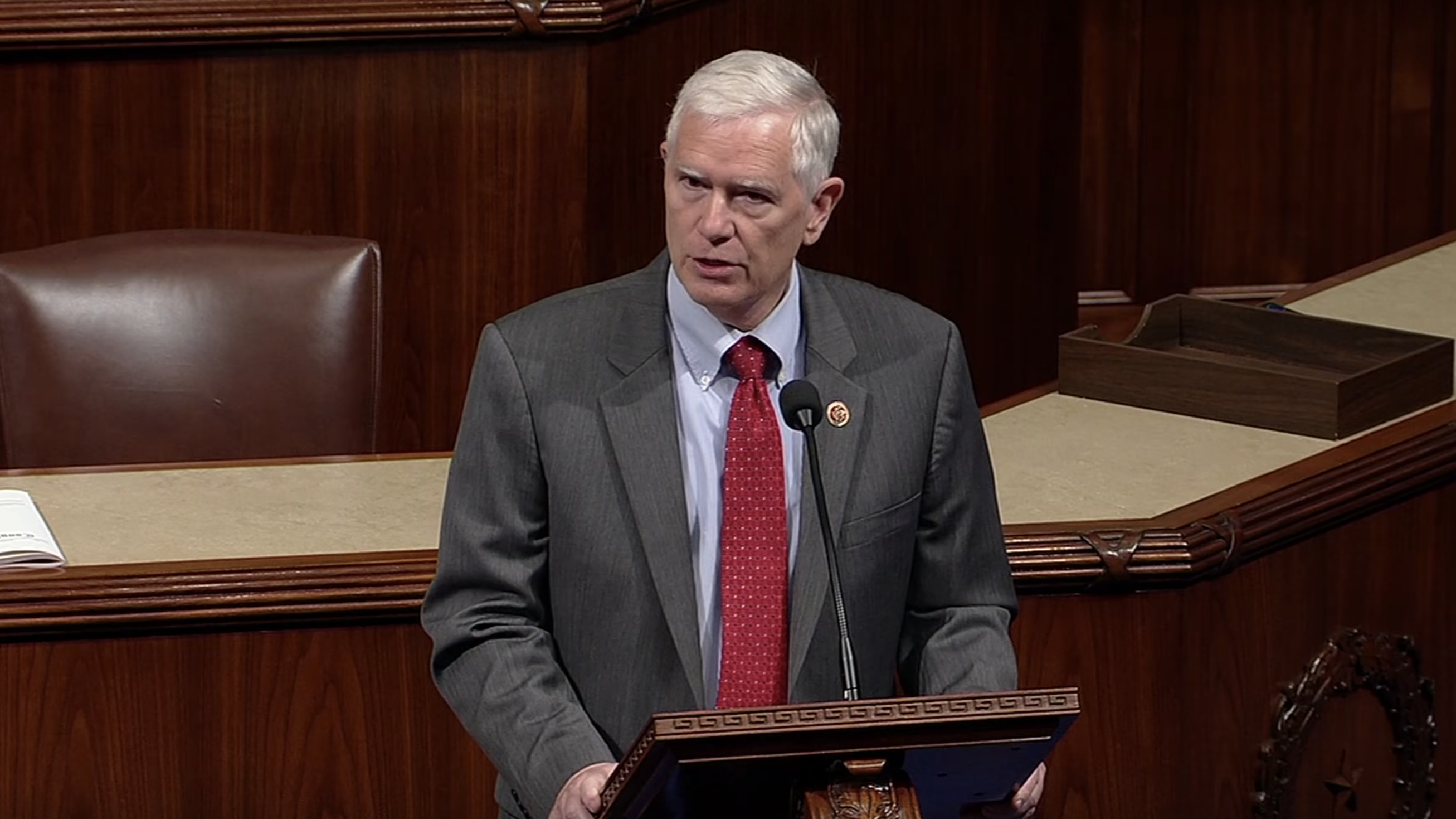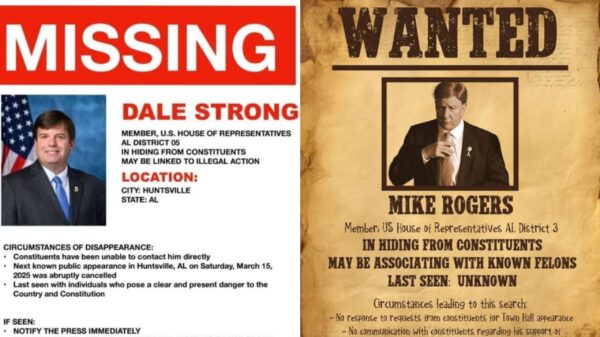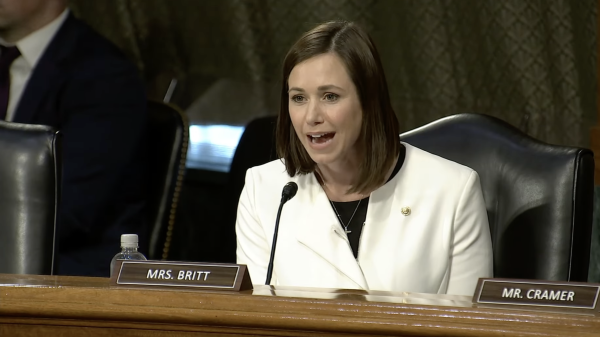Twenty-eight bipartisan members of the U.S. House of Representatives, led by Congressman Mo Brooks, R-Huntsville, sent a letter to United States Air Force Secretary Heather Wilson on Friday, April 12 declaring their support for the Air Force’s National Security Space Launch Program’s Phase 2 acquisition strategy.
The signers requested the Air Force refrain from weakening any performance requirements and emphasized the importance of limiting Phase 2 missions to two launch providers.
“America’s national security weaponry overwhelmingly relies on space assets to properly function,” Brooks said. “As such, America must have reliable and affordable space access options. The Air Force conducted a robust and competitive launch provider selection process open to all U.S. launch providers. National security needs require the Air Force’s launch provider acquisition to remain on schedule.”
“Current law mandates that America stop relying on Russian rocket engines,” Brooks said. “Congress debated this in 2017 and rightly determined that reliance on rocket engines built by a potential adversary is entirely unacceptable. In fact, that is one of the main drivers of the Air Force’s current acquisition schedule. If launch provider acquisition is delayed, America cannot ensure we can reliably launch space assets on time. The Air Force should not weaken performance requirements, particularly for America’s most sensitive national security missions because doing so risks mission loss caused by lesser quality rockets.”
“The Air Force has determined that there are enough launch missions to support two providers but not three,” Brooks said. “Having only one launch provider is costly and risky. While three or more launch providers are an option, there simply are not enough missions available to profitably allow three or more providers to coexist. More launches equals fewer launches per provider which, in turn, means higher taxpayer cost resulting from the loss of economies of scale that reduce prices. Essentially, one launch provider is not enough and three providers are too many. Two providers is the sweet spot, and the sooner we get to two providers, the better off America and its taxpayers will be.”
The Brooks led letter was cosigned by: Congressman Robert Aderholt (AL-04), Congressman Troy Balderson (OH-12), Congressman Rob Bishop (UT-01), Congressman Ken Buck (CO-04), Congressman Bradley Byrne (AL-01), Congressman Steve Chabot (OH-01), Congressman Jason Crow (CO-06), Congressman Warren Davidson (OH-08), Congresswoman Diana DeGette (CO-01), Congressman Chuck Fleischmann (TN-03), Congressman Paul A. Gosar, D.D.S (AZ-04), Congresswoman Jaime Herrera Beutler (WA-03), Congressman David P. Joyce (OH-14), Congresswoman Marcy Kaptur (OH-09), Congressman Doug Lamborn (CO-05), Congressman Brian Mast (FL-18), Congresswoman Ann McLane Kuster (NH-02), Congressman Paul Mitchell (MI-10), Congressman Dan Newhouse (WA-04), Congressman Ed Perlmutter (CO-07), Congresswoman Martha Roby (AL-02), Congresswoman Linda T. Sanchez (CA-38), Congresswoman Terri A. Sewell (AL-07), Congressman Brad Sherman (CA-30), Congressman Scott Tipton (CO-03), Congressman Michael R. Turner (OH-10) and Congressman Brad Wenstrup (OH-02).
In the letter Brooks wrote: “We write to you in support of the Air Force’s National Security Space Launch program’s Phase 2 acquisition strategy. As you have made clear during your tenure, space is increasingly a contested domain, and countries such as Russia and China are making massive investments in space capabilities that threaten America and her allies.”
“In order to outpace our adversaries, we must maintain reliable and affordable assured access to space,” Brooks continued. “To this end, the Air Force conducted the most competitive acquisition in space launch history resulting in award of three competitive Other Transaction Authorities to U.S. launch providers last October. These public-private-partnerships ensure that the rigorous requirements of national security space launch are met while also allowing industry to innovate in ways the government cannot. Additionally, the use of these OTAs ensures that companies have significant skin in the game, allowing the nation to obtain next-generation launch technology at a fraction of the cost.”
“We commend your decision to allow all U.S. launch providers to compete for Phase 2 missions, and request you do everything in your power to keep the acquisition on schedule,” Brooks said. “Lieutenant General John F. Thompson, Commander of the Air Force Space and Missile Systems Center, Air Force Space Command, spoke to the Air Force’s position before the Senate Armed Services Committee on March 27, when he stated, “We’re confident we’re on the right path for our nation’s war fighting capability and that we’re being good stewards of the taxpayers’ dollars.” Further delays in Phase 2 could extend our reliance on Russian rocket engines and will deprive the nation of a second launch provider capable of launching the most complicated missions.”
“Additionally, we ask that you refrain from weakening any performance requirements, particularly for our nation’s most sensitive missions,” Brooks added. “Allowing providers to only compete for smaller, simpler missions threatens the very concept of assured access to space, creating a de facto monopoly for heavy space lift. Finally, it is critical that you limit Phase 2 missions to two providers. This ensures competition and keeps our national security launch providers healthy. In the same hearing, General Thompson addressed this as well: “A number of folks have asked us if it’s possible to split it [Phase 2 missions] three ways. Our launch manifest that we need to purchase between 2020 and 2024 simply does not support three offers in that trade space at the same time. None of the offers’ business cases would close if we tried to open it up to three different offers.””
To read Congressman Brooks’ letter, click here.
United Launch Alliance, which build their rockets in Decatur, is expected to compete for that rocket contract. ULA is jointly owned by Boeing and Lockheed Martin. For many years ULA has built it’s rockets with rocket engines built in Russia. Due to growing international tensions between Russia and the U.S., ULA will begin building its rockets with engines supplied by Blue Origin at Blue Origin’s new rocket engine factory being built in Huntsville. SpaceX is another major American supplier of rockets and spacecraft.
Congressman Mo Brooks represents Alabama’s Fifth Congressional District.






















































